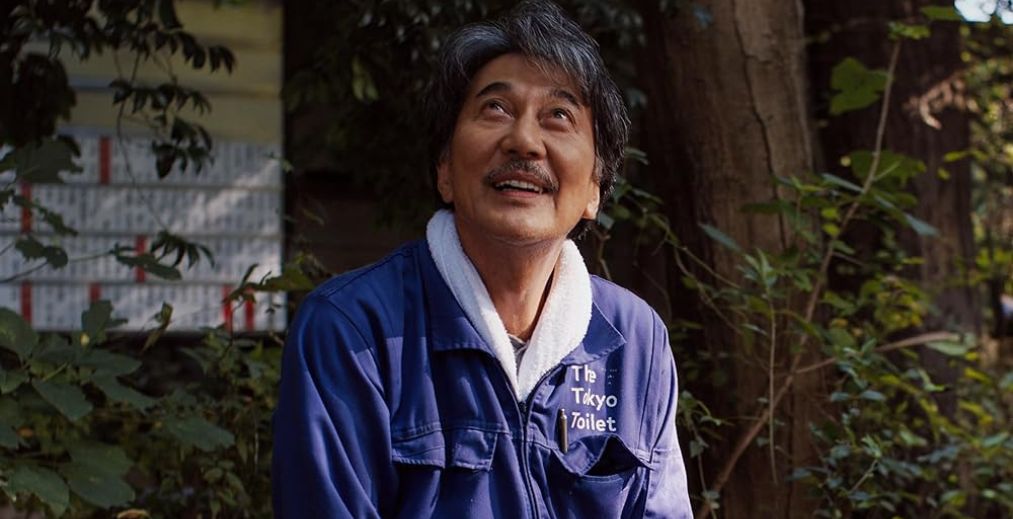Kōji Yakusho reveals more truths about the human condition through his eyes alone than many a performer could with a wordy, emotionally explosive script. As Hirayama in Perfect Days, the latest film from Wim Wenders, Yakusho delivers a commanding, poignant performance as a man absorbing the simplest virtues of life. A staggering portrait of what it means to truly commit to stillness and gratitude without undermining an individual’s hardships, the film encompasses beauty in the mundane.
Perhaps the greatest element of Perfect Days is how Wenders captures the idea that a minimalist life isn’t a small one. Hirayama works as a cleaner in Tokyo’s public toilets with structure and routine. Seemingly content, he spends time away from work, indulging in his passion for music and books. His small apartment has shelves meticulously lined with cassette tapes and novels, which he peruses in a local shop with a rack of dollar books. Broken into short stories, the film observes Hirayama’s routine through slice-of-life vignettes as he engages with co-workers, family members, and people who have slowly filtered into his neatly packaged life.
In one sequence, he gets to know his frankly obnoxious co-worker Takashi (Tokio Emoto) better. At first, it seems that the inclusion of this character simply shows a wrinkle in Hirayama’s collected nature. Instead, the film surprises us and Hirayama when Takashi reveals hidden depths. A young woman Takashi is pursuing expressing interest in the cassette tapes Hirayama travels with in his van. On his days off, Hirayama goes to a local laundromat and basks in the sunlight like a cat. He pays to develop his film for his photography hobby, spending his days snapping shots of shadows and trees. He visits a local bar where a woman croons “The House of the Rising Sun” to her three patrons.
The only disruption is the arrival of his niece, Niko (Arisa Nakano), a kindred spirit. But even still, this is less a disruption than a ripple to his organized life. The filmmaking here cleverly demonstrates the power of music in film as we momentarily engage in Hirayama’s world through the eyes of Niko, as Van Morrison’s “Brown Eyed Girl” plays.

Despite the studious, patient nature of the story, there’s a playful vigor in the direction by Wenders. This matches Yakusho’s open-faced and earnest performance, even when he speaks hardly a word. He smiles with his eyes and greets each scene with warmth. Despite his solitude and silence, Hirayama isn’t so much a mysterious character as he is sincere. Here’s a man who seeks to live a life on his terms. His observation is attuned to nature and the finite beauty around him. It’s what makes his moments of emotional strife all the more affecting, hinting at all that we don’t know about a character who, until these sequences, has been unguarded and unrestrained.
Written by Wenders and Takuma Takasaki, Perfect Days busies itself with the curiosities and whimsy of life. Vending machine coffee, egg salad sandwiches in Ueno Park, beers along the riverside — there’s so much love packed into the two-hour run time for moments that are so easily unnoticed. Set in Tokyo, the story overflows with affection for this city, especially in the quieter, tucked-away locations.
Along with cinematographer Franz Lustig and editor Toni Froschhammer, Wenders weaves visual poetry into a city skyline. Perhaps the best indication of the film’s style is the transitional scenes. The film stills in his bedroom each morning before Hirayama awakens. His soft-lit room takes up the whole frame as the early morning sun pours in. These moments embody the visceral effect of the film, which feels the breeze that Hirayama turns his face into. These moments speak more to fantasy than realism in the vibrant, cool colors. But even in dreamy, avant-garde sequences, the film never loses itself. The film is rooted, like the trees Hirayama observes, in the earthy world he himself is bound to.
Perfect Days, with its good-natured protagonist and empathetic gaze, is sublime. “Now is now,” Hirayama tells his niece Niko. It’s a simplistic statement meant to ease her queries about the future. But it speaks to the magic of the film, too. We can’t spend all of our time worrying about the past or engaged in a future that’s yet to be. But we can listen to our favorite song, make small talk with the bookshop keeper about their favorite novels, and greet each day anew. With all of its quiet contemplations, the film demonstrates a keen understanding of what it means to value all that life offers us.
Perfect Days is now playing in theaters.
Perfect Days
-
Rating - 9/109/10
TL;DR
Perfect Days, with its good-natured protagonist and empathetic gaze, is sublime. With all of its quiet contemplations, the film demonstrates a keen understanding of what it means to value all that life offers us.





